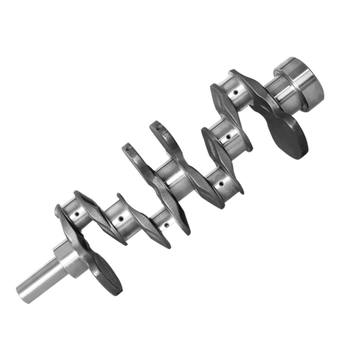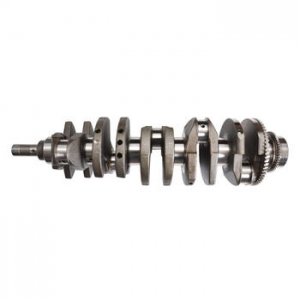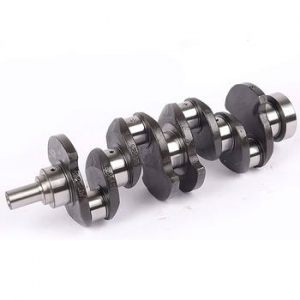Let's dive straight in. We're talking about the crankshaft for Hyundai D4DB/4D34T engines, specifically the OEM part number 23100-45500. A crankshaft, for those less familiar, is essentially the backbone of an internal combustion engine. It's the rotating shaft that transforms the reciprocating motion of the pistons into rotational motion, which then drives the wheels of your vehicle. So, finding the right one, particularly an OEM (Original Equipment Manufacturer) part, is absolutely crucial for your engine's health and performance. This particular crankshaft is designed to perfectly fit and function within Hyundai D4DB and 4D34T engines, ensuring optimal performance and minimizing potential issues down the line.
Understanding the Importance of the Crankshaft
The crankshaft endures tremendous stress during the engine's operation. Think about it: it's constantly spinning, subjected to intense pressure from the pistons, and dealing with high temperatures. Because of this, the crankshaft needs to be incredibly strong and durable. It’s usually made from high-grade steel alloys and meticulously machined to precise tolerances. Any imperfections or weaknesses in the crankshaft can lead to catastrophic engine failure. This is why investing in a quality crankshaft, particularly an OEM part like the 23100-45500, is a smart move. Aftermarket parts might seem tempting due to lower prices, but they often compromise on material quality and manufacturing precision, which can cost you more in the long run.
Hyundai D4DB and 4D34T Engines: A Closer Look
Now, let's focus on the engines themselves: the Hyundai D4DB and 4D34T. The D4DB is a naturally aspirated diesel engine, while the 4D34T is a turbocharged version. Both engines are known for their reliability and durability, often found in commercial vehicles like trucks and buses. These engines are workhorses, designed to withstand demanding conditions. The crankshaft plays a pivotal role in their performance, contributing to their power output, fuel efficiency, and overall longevity. Using an OEM crankshaft specifically designed for these engines ensures compatibility and optimal performance characteristics, maximizing the engine's potential and preventing issues that might arise from using a generic or ill-fitting part. Why risk your engine's health by opting for something less reliable?
OEM vs. Aftermarket Crankshafts: The Key Differences
The debate between OEM and aftermarket parts is a classic one in the automotive world. While aftermarket parts can be cheaper, there's a significant difference in quality and reliability. OEM crankshafts, like the 23100-45500, are manufactured to the exact specifications of the original engine. This means they are guaranteed to fit perfectly and function optimally. Aftermarket crankshafts, on the other hand, might be made with different materials, tolerances, or designs. This can lead to issues like premature wear, reduced performance, and even engine failure. Consider it this way: you're trusting a vital component of your engine to something that might not be up to the task. Is the small upfront saving really worth the potential risk and hassle? Frankly, I don't think so.
OEM 23100-45500: Key Features and Benefits
Let's highlight the specific features and benefits of the OEM 23100-45500 crankshaft. Firstly, it's manufactured to meet Hyundai's stringent quality standards. This means it's made from high-quality materials, undergoes rigorous testing, and is guaranteed to perform as expected. Secondly, it's designed for a perfect fit within the D4DB and 4D34T engines, ensuring optimal balance and reduced vibration. Thirdly, it contributes to improved fuel efficiency and reduced emissions. Finally, it enhances the overall durability and lifespan of the engine. When you choose an OEM crankshaft, you're not just buying a part; you're investing in the long-term health and performance of your engine. According to our experience, this is the most cost-effective solution in the long run.
Potential Issues with Using Non-OEM Crankshafts
Using a non-OEM crankshaft can lead to a whole host of problems. For instance, incorrect balancing can cause excessive vibration, leading to premature wear on bearings and other engine components. Improper material selection can result in cracking or failure under stress. Inaccurate machining can cause oil leaks or poor lubrication. And, of course, an ill-fitting crankshaft can cause serious damage to the engine block and pistons. These issues can result in costly repairs, downtime, and even complete engine failure. So, while the initial cost of an aftermarket crankshaft might be lower, the potential long-term costs can be significantly higher. We’ve seen many instances of customers regretting going the cheaper route when it comes to critical engine components.
Real-World Applications and Examples
Consider a fleet of Hyundai trucks used for long-haul transportation. These trucks rely on the D4DB or 4D34T engines to deliver goods across the country. If a crankshaft fails in one of these trucks, it can result in significant delays, lost revenue, and potential damage to the transported goods. By using OEM 23100-45500 crankshafts, fleet managers can minimize the risk of engine failure and ensure the reliable operation of their vehicles. Similarly, imagine a bus company that relies on Hyundai buses for public transportation. Engine reliability is paramount for maintaining schedules and ensuring passenger safety. Using OEM crankshafts in these buses helps to prevent breakdowns and keeps the buses running smoothly. These are just two examples of how the choice of crankshaft can impact real-world operations and bottom lines.
Installation and Maintenance Considerations
Proper installation is crucial for ensuring the longevity and performance of the crankshaft. It's important to follow the manufacturer's instructions carefully and use the correct tools and techniques. The crankshaft should be properly aligned and torqued to the specified values. Additionally, regular maintenance, such as oil changes and inspections, can help to identify potential problems early on and prevent costly repairs. It’s always recommended to have a qualified mechanic perform the installation and maintenance to ensure that everything is done correctly. Do you know the correct torque specifications for your engine? If not, it’s best to leave it to the professionals.
Why We Recommend OEM Crankshafts
At our company, we understand the importance of quality and reliability when it comes to engine components. That's why we strongly recommend using OEM crankshafts whenever possible. We believe that the peace of mind and long-term cost savings outweigh the initial investment. We've seen firsthand the negative consequences of using substandard parts, and we want to help our customers avoid those problems. We offer a wide range of OEM parts, including the 23100-45500 crankshaft for Hyundai D4DB and 4D34T engines, to meet the needs of our customers. We stand behind the quality of our products and are committed to providing excellent customer service.
Considering a Crankshaft Replacement? Ask Yourself This…
Before you make a decision about replacing your crankshaft, consider a few things. What are the symptoms you're experiencing? Is the engine making unusual noises, vibrating excessively, or losing power? Have you had a professional diagnose the problem? What's the overall condition of your engine? Is it worth investing in a new crankshaft, or would it be more cost-effective to replace the entire engine? Answering these questions will help you make an informed decision about the best course of action. Speaking of best course of action, you should consult with a qualified mechanic or engine specialist.
In Conclusion: Investing in Engine Longevity
In conclusion, when it comes to the crankshaft for your Hyundai D4DB/4D34T engine, opting for the OEM part number 23100-45500 is a wise investment. The crankshaft is the heart of your engine, and using a quality OEM part ensures optimal performance, reliability, and longevity. While aftermarket options might seem appealing due to their lower prices, the potential risks and long-term costs far outweigh the savings. By choosing an OEM crankshaft, you're investing in the health and performance of your engine, and ultimately, saving yourself time, money, and frustration in the long run. Remember, your engine’s health is directly tied to the quality of its components, and the crankshaft is no exception.




